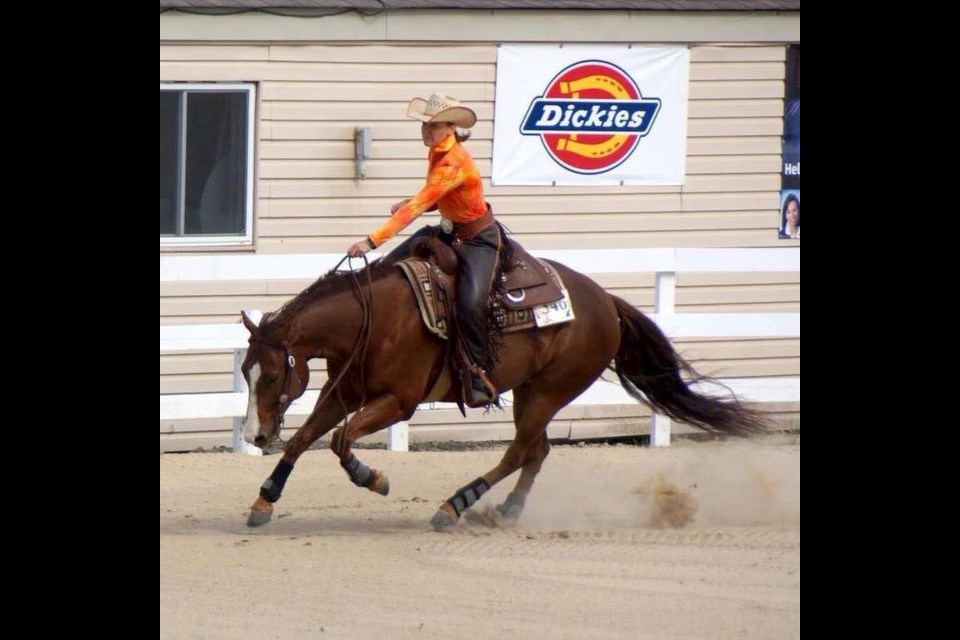To describe "reining" as the dressage of western style riding is somewhat simplistic, though it does provide a foundation from which to build.
To add more layers of knowledge, bringing Anne Salter-Dorland and her daughter, Giorgia Apolloni, into the conversation is clearly the way to go. The tandem, who form part of the very small community of this equestrian initiative in Northern Ontario, are currently in Oklahoma City, site of the North America Affiliate Championship.
The event brings together somewhere between 1,000 to 1,500 horses and a similar number of riders, competing in what amounts to a world championship in the sport.
For Salter-Dorland, a native of Iroquois Falls who moved to Sudbury nearly thirty years ago, it was a given that horses would be part of her life.
"I started riding with my best friend when I was probably four or five, but did not get my own horse until my late teens," she said. "Over the years, I've done all of the disciplines: jumping, barrels, dressage. A friend in reining once told me that I was not an English girl, I'm a western girl. Of all of the disciplines that I've done, this is the most exhilirating."
Where traditional dressage sees horses moving at a relatively slow pace, with a look of eloquence to both animal and rider alike, reining combines elements of cow horsing (using horses to guide cattle), at an up-beat tempo, removing the steer from the mix.
Let's just say that you have to see it to appreciate it. But once you do see it, one can easily become hooked.
"Good equitation is good equitation, no matter what discipline you're riding," explained Sater-Dorland. "In western, everything is done one-handed. My hand is on his neck and that horse has to know whether to go right, left, spin, and my hand never moves. We dictate every move that the horse makes without it ever appearing like the horse is being dictated to. It's extremely dynamic and the crowd really gets into it. There is nothing slow about it.
"Reining is the only western discipline that is accepted by the International Equine Federation."
With horses being judged on a series of manouevres, the ability to relate scores, world-wide, allows for a basis of comparison. Of the 1,700 or so riders that join Salter-Dorland in her particular category, the local horseman finds herself in the top ten, internationally speaking.
This year marks the fourth time that she has qualified for the defacto World Championships, though she has yet to actually compete at the event that runs for the better part of a two week period. This year, she is taking a pass in order to allow Apolloni to compete, with the classes of competition for mother and daughter at the very opposite ends of the Oklahoma City calendar.
A student at Cambrian College, Apolloni finished first in both the Rookie I and Rookie II classifications at the 2018 Eastern Canadian Affiliate Championships earlier this year in Quebec.
Not that this success comes as a great surprise to Salter-Dorland.
"I used to put her on the back of my reining horse when she was just a little girl," she said. "She had a Shetland pony and her little legs would just start going, she was so excited."
Excitement, alone, however, is hardly the making of a champion rider.
"I used to have one horse named Clancy, that was a lot of fun to ride," said Apolloni. "He was a really good horse that you could learn on. He had some quirks, every horse does. He really made me work hard to get the confidence to show in the pen. It was really cool to start out like that."
Over time, the finer nuances of outstanding riding would become engrained in the local product.
"I've learned how to develop a better feel for the horse," said Apolloni. "Instead on being on auto pilot, I become one with the horse. When I am riding, I'm anticipating the horse, trying to figure out how I can become better with every ride."
Not that she has to look far for motivation. Though she might be a MacIntosh to her mother's Cortland, the apple still doesn't fall too far from the tree.
"She (Anne) has, pardon my language, the balls to take that step further outside of the box and challenge the horse," said Apolloni. "I can slowly get a horse there, but she can push them. It's really cool to watch."
And where Clancy might have been a mainstay in her youth, Apolloni has developed an appreciation for the benefits of diversification, particularly in training sessions.
"From a beginner's standpoint, having a horse that you can learn on and consistently learn on is very important," she said.
"But at my level and my mom's level, catch riding (riding different horses that you have little experience with) is the most thrilling and the best way to improve," added Apolloni.
"Every horse will teach you something different," chimed in Salter-Dorland. "But in the show pen, it's good to have a consistent horse to develop that partnership."
And taking it a step further, enjoying that ring excitement in the grandest of settings, well, that's pretty much the best that the equestrian family could ask for.
"Quebec was big, but this arena is the size of one and a half football fields," said Apolloni. "Even the arena dirt is so in tune with the sport. It's going to be amazing."
